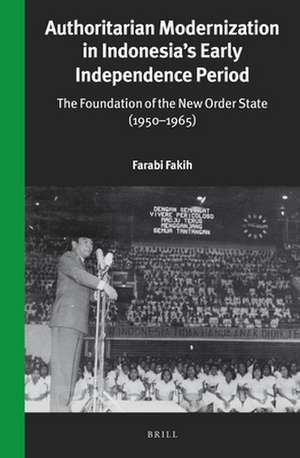Authoritarian Modernization in Indonesia’s Early Independence Period: The Foundation of the New Order State (1950-1965): Verhandelingen Van Het Koninklijk Instituut Voor Taal-, Land- En Volkenkunde, cartea 312
Autor Farabi Fakihen Limba Engleză Hardback – 26 aug 2020
Din seria Verhandelingen Van Het Koninklijk Instituut Voor Taal-, Land- En Volkenkunde
-
 Preț: 376.80 lei
Preț: 376.80 lei -
 Preț: 386.61 lei
Preț: 386.61 lei -
 Preț: 397.59 lei
Preț: 397.59 lei -
 Preț: 376.80 lei
Preț: 376.80 lei -
 Preț: 378.71 lei
Preț: 378.71 lei -
 Preț: 392.60 lei
Preț: 392.60 lei -
 Preț: 383.12 lei
Preț: 383.12 lei -
 Preț: 383.12 lei
Preț: 383.12 lei -
 Preț: 392.21 lei
Preț: 392.21 lei -
 Preț: 385.25 lei
Preț: 385.25 lei -
 Preț: 382.57 lei
Preț: 382.57 lei -
 Preț: 392.97 lei
Preț: 392.97 lei -
 Preț: 377.18 lei
Preț: 377.18 lei -
 Preț: 390.63 lei
Preț: 390.63 lei -
 Preț: 384.48 lei
Preț: 384.48 lei -
 Preț: 376.96 lei
Preț: 376.96 lei -
 Preț: 403.75 lei
Preț: 403.75 lei -
 Preț: 386.81 lei
Preț: 386.81 lei -
 Preț: 387.38 lei
Preț: 387.38 lei -
 Preț: 382.95 lei
Preț: 382.95 lei -
 Preț: 396.40 lei
Preț: 396.40 lei -
 Preț: 383.12 lei
Preț: 383.12 lei - 23%
 Preț: 706.84 lei
Preț: 706.84 lei -
 Preț: 380.84 lei
Preț: 380.84 lei -
 Preț: 383.12 lei
Preț: 383.12 lei -
 Preț: 397.38 lei
Preț: 397.38 lei -
 Preț: 387.96 lei
Preț: 387.96 lei -
 Preț: 403.37 lei
Preț: 403.37 lei -
 Preț: 385.84 lei
Preț: 385.84 lei -
 Preț: 391.02 lei
Preț: 391.02 lei -
 Preț: 389.31 lei
Preț: 389.31 lei -
 Preț: 398.53 lei
Preț: 398.53 lei -
 Preț: 392.97 lei
Preț: 392.97 lei -
 Preț: 390.46 lei
Preț: 390.46 lei -
 Preț: 113.27 lei
Preț: 113.27 lei -
 Preț: 113.27 lei
Preț: 113.27 lei -
 Preț: 113.27 lei
Preț: 113.27 lei -
 Preț: 107.65 lei
Preț: 107.65 lei -
 Preț: 117.98 lei
Preț: 117.98 lei -
 Preț: 113.27 lei
Preț: 113.27 lei -
 Preț: 57.59 lei
Preț: 57.59 lei -
 Preț: 130.22 lei
Preț: 130.22 lei -
 Preț: 130.22 lei
Preț: 130.22 lei -
 Preț: 105.69 lei
Preț: 105.69 lei -
 Preț: 113.27 lei
Preț: 113.27 lei -
 Preț: 101.96 lei
Preț: 101.96 lei -
 Preț: 90.66 lei
Preț: 90.66 lei -
 Preț: 141.53 lei
Preț: 141.53 lei
Preț: 536.26 lei
Preț vechi: 653.97 lei
-18% Nou
Puncte Express: 804
Preț estimativ în valută:
102.63€ • 106.02$ • 85.41£
102.63€ • 106.02$ • 85.41£
Carte indisponibilă temporar
Doresc să fiu notificat când acest titlu va fi disponibil:
Se trimite...
Preluare comenzi: 021 569.72.76
Specificații
ISBN-13: 9789004404748
ISBN-10: 9004404740
Dimensiuni: 155 x 235 mm
Greutate: 0 kg
Editura: Brill
Colecția Brill
Seria Verhandelingen Van Het Koninklijk Instituut Voor Taal-, Land- En Volkenkunde
ISBN-10: 9004404740
Dimensiuni: 155 x 235 mm
Greutate: 0 kg
Editura: Brill
Colecția Brill
Seria Verhandelingen Van Het Koninklijk Instituut Voor Taal-, Land- En Volkenkunde
Notă biografică
Dr. Farabi Fakih (Leiden University, 2014), is Lecturer of Indonesian History at Gadjah Mada University. His research interests mainly lie in Indonesian urban history, the political-economic history of the Indonesian state and Indonesian business history.
Recenzii
"Fakhi (Gadjah Mada Univ., Indonesia) upsets the conventional view of military interference in politics in a society rooted in dictatorship, detailing how Indonesia’s armed forces were invited, even co-opted, by civil officials and elected politicians to co-govern in a power-sharing arrangement."
– E. Pang, Colorado School of Mines, in Choice Connect
– E. Pang, Colorado School of Mines, in Choice Connect
